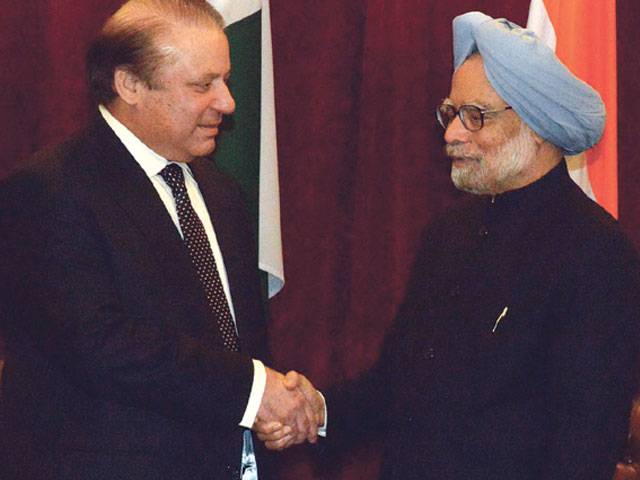NEW YORK - The prime ministers of Pakistan and India on Sunday agreed to end the recent spate of attacks along the Line of Control in the disputed Kashmir region as they expressed their commitment to improve strained relations, said senior officials of the two countries.
Nawaz Sharif and Manmohan Singh met for just over an hour at a New York hotel on the sidelines of the UN General Assembly. It was their first meeting since Prime Minister Sharif assumed power in June. Both the leaders invited each other to their respective countries, but no dates were given.
In separate briefings, both Pakistan Foreign Secretary Jalil Abbas Jilani and Indian National Security Adviser Shiv Shankar Menon called the top-level meeting positive, useful and constructive.
Jilani told reporters that Prime Minister Nawaz Sharif and Singh had tasked senior military officers (Directors General of Military Operations) to find a mechanism to shore up the Line of Control.
“They both agreed that the pre-conditions for a forward movement in the relationship which they both desire is an improvement of the situation on the Line of Control,” Menon said. “Our overall impression of the meeting is that it was useful because it provided an opportunity for a high-level contact on the issues that are troubling the relationship,” he said. “We will now see how both sides take it forward in the next few months.”
The Pakistan foreign secretary said Prime Minister Nawaz Sharif called for the resolution of all outstanding matters, including Jammu and Kashmir, foreign interference in Balochistan, Siachen, Sir Creek and water issues.
“The prime minister emphasised that resolution of all the issues, including Jammu and Kashmir, is certainly imperative to bring about peace and security to the region,” the foreign secretary told international media. Prime Minister Sharif asserted that there was no option but to have a sustained dialogue between the two countries, he added.
“He believes the two countries can prosper while making movement on the issues which have adversely affected relations,” the foreign secretary added. The question of terrorism was also discussed, he confirmed, saying terrorism was as much a concern of Pakistan as of India. “We are aware of Indian concerns and our concerns are also well known to the Indian side on the issue of terrorism,” he said.
The foreign secretary stressed that Islamabad takes all decisions under the leadership of the prime minister. “Let me emphasise all institutions are on the same page on the issue of terrorism.”
With regard to the Mumbai 2008 bombing issue, he pointed out that progress on the case was slowed down because of the delay in the visit of the Pakistani Judicial Commission to India. Now since the commission had returned after interviewing and cross-examining the witnesses, it would present the findings to the court and this trial would proceed forward.
In response a question, he said, “Kashmir is an important issue that needs to be resolved. There is no alternative to a sustained and uninterrupted dialogue between the two countries,” he asserted.
As regards Indian media reporting that the prime minister had used word “Dehati Aurat” in reference to Manmohan Singh’s complaint to the US president, the foreign secretary said the Pakistani leader did not use that term. Actually, the Indian media had itself clarified it, he added.
When the Indian official was asked about Indian interference in Balochistan, he said it was mentioned at the meeting, but there was no question of India’s interfering in Pakistan’s internal affairs. “My impression is that it was a useful and constructive meeting,” Menon said.
“We need to fix the issues first in order to move forward,” he said, noting it was a desire on both the sides.
“We can work hard in the next few months,” he said, when pressed if the two sides discussed specific steps that could help revival of composite dialogue and peace process.
Shiv Shankar Menon said the Sharif-Singh meeting had helped both sides have some amount of understanding of how to move forward. “We strongly raised the issue of cross-border terrorism,” he said and added peace on the LoC was a precondition for normalisation of the relationship. He said the two prime ministers spoke of the desire for better relations and the difficulties in the way.
Menon said Pakistan had raised the issue of violence in its Balochistan and of India’s alleged interference in its internal affairs.
Friday, April 19, 2024
Nawaz, Manmohan agree to calm Control Line
| Task DGMOs to develop mechanism | Kashmir, foreign interference in Balochistan, Siachen, Sir Creek and water issues raised | Indian side terms LoC peace a precondition for further talks | Both PMs extend visit invites to each other, but no dates given | Foreign secys describe the summit as useful, constructive

12:00 PM | April 19, 2024
Minister reviews naan, roti prices
April 19, 2024
ETPB land worth Rs 40b retrieved so far
April 19, 2024
Lahore revamping plan to complete by June 30
April 19, 2024
CCPO reviews security for by-elections, NZ cricket matches
April 19, 2024
A Tense Neighbourhood
April 19, 2024
Dubai Underwater
April 19, 2024
X Debate Continues
April 19, 2024
Hepatitis Challenge
April 18, 2024
IMF Predictions
April 18, 2024
Kite tragedy
April 19, 2024
Discipline dilemma
April 19, 2024
Urgent plea
April 19, 2024
Justice denied
April 18, 2024
AI dilemmas unveiled
April 18, 2024
ePaper - Nawaiwaqt
Advertisement
Nawaiwaqt Group | Copyright © 2024





